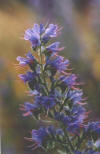
"To make a prarie, it takes a clover and one bee. One clover, and a bee, and reverie. The reverie alone will do, if bees are few." - Emily Dickinson
With more praries and clover and reverie - there may be more bees, though.
Help to launch Britain's first bee reserve
Plans for a bee conservation reserve in the wilds of western Scotland have been drawn up by environmentalists trying to save Britain's rarest species of bumblebee.
Just weeks after The Independent highlighted the work of the The Bumblebee Conservation Trust(BCT) the organisation has launched a nationwide appeal to raise funds for its first nature reserve specially created for bees....
"Thanks to the incredible support that we have received since the launch of the trust we are in a position to consider buying and managing our first nature reserve," said a spokesman for the BCT.
"Our first priority is to protect Britain's rarest bumblebees in their last remaining stronghold in the Outer Hebrides. "The habitat here is held in a fragile balance, which is only maintained by the use of traditional farming methods."
_________

Flowers to grow that Bumblebees esp. like:
BORAGINACEAE: the borages
FABACEAE: the peas (including clover)
ASTERACEAE: greater knapweed
SCROPHULARIACEAE: foxglove (wild purple type)
LAMIACEAE: the mint family (includes thyme and ajuga)
ROSACEAE: roses and their relatives
___
Other good things to grow for Bumblebees include:
Apple,
Buddleia,
Campanula,
Cherry,
Chives and other Alliums,
Catmint,
Cotoneaster,
Currants,
Delphinium ,
Hollyhock,
Lavender,
Marjoram,
Pear,
Plum,
Raspberry,
Rhododendron,
Sage,
Sunflower, Helianthus
Basic things to consider:
Do not spray insecticide.
Replace part of your lawn with wildflowers.
If you have a large lawn - just leave some as a meadow.
(I'll post more on creating wildflower areas to replace grass later.)
___
North American Wildflower List - for bumblebees
Bumblebees of the World
___
On a positive note:
Tiny bee stages comeback on Scottish island
Britain's most solitary bee has been found thriving on the remote Western Isles.
Once a relatively common sight throughout the higher-altitude agricultural lands of the UK, the increasingly rare Colletes floralis has been forced to the outer edges of the British Isles by modern farming practices, changing land management and climate change.
No comments:
Post a Comment